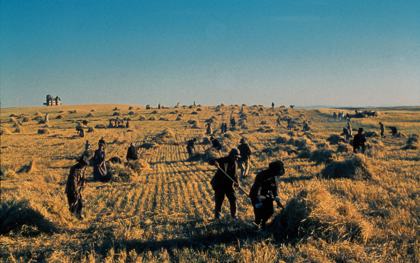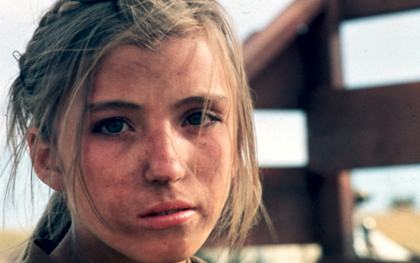Review / From the archives
Days of Heaven

Terrence Malick’s portrait of a fleeting utopia in the lie between four souls working the pre-WWI Texan wheatfields distills a poetic vision of paradise lost, wrote Tom Milne in the May 1979 Monthly Film Bulletin
Days of Heaven
USA 1978
Director: Terrence Malick
With Richard Gere, Brooke Adams, Sam Shepard, Linda Manz
94 mins | Cert PG
Synopsis
Our synopses give away the plot in full, including surprise twists.
Chicago, 1916. Fleeing the industrial inferno where he sweats out a miserable living, Bill hops a train heading south with his kid sister Linda and his girl Abby, whom he also claims as his sister to prevent people from talking. In the Texas Panhandle, they are hired for the wheat harvest along with other migrant workers; and Bill soon realises that the wealthy young farmer, unmarried and with no relatives, is attracted to Abby. Hearing that the farmer has no more than a year to live, Bill urges Abby to marry him so that they can inherit when he dies; and Abby reluctantly agrees to the farmer’s suggestion that she continue working for him after the harvest, stipulating that Bill and Linda must stay too.
Soon Abby and the farmer are married, Bill and Linda move into the house during the honeymoon, and with very little work to be done, all four are blissfully happy, lazing and playing games together. But Abby is sneaking out at nights to see Bill; the farmer, seemingly taking on a new lease of life, gets no better and no worse; and thinking of killing him, Bill finds he cannot pull the trigger. With Abby increasingly unhappy, suspicions stirred up by his devoted foreman begin to dawn on the farmer. Realising that Abby has fallen in love and that it is his own fault, Bill decides to leave with a flying-circus troupe which has dropped in on them.
Next harvest, Bill reappears briefly, but is seen kissing Abby goodbye by the farmer, who suffers renewed doubts. A plague of locusts descends on the farm and, crazed by jealousy, the farmer allows the fire being used against the locusts to spread, before confronting Bill with a gun. Almost inadvertently, Bill kills him with a screwdriver. Fleeing from the gutted farm, Bill, Abby and Linda are tracked down by a posse led by the vengeful foreman, and Bill is shot. Abby takes Linda to a boarding-school, then hops a train full of servicemen heading for the war in Europe. Running away from the school with a friend, Linda heads optimistically down the road.
Review
At the risk of being accused of repeating himself, Terrence Malick has here virtually reorchestrated (though with incomparably greater richness) the principal features of Badlands, using an oblique voice-off commentary to distantiate and lend poetic dimensions to the otherwise fairly banal story of young fugitives fleeing from the intolerable frustrations of society. Where Badlands was about the unilateral influences of untamed landscapes on two young urban delinquents, Days of Heaven widens its perspective to describe no less than mankind, the Earth, and their mutual interaction. Following and black-and-white montage of photographs summing up the legacy of industrial revolution, two images perfectly describe the totality if the urban inferno: outside, under a bleak sky, women drudge through a mountain of slag in quest of fragments of coal; inside, roasted by hellish flames, men toil like robots to keep the furnaces alive. Then, seen silhouetted against the skyline with people clinging to every inch of its surface, the train looms as a Noah’s ark heading for the promise of a new world, seemingly fulfilled as the paradise of the Texan wheatfields begin to stretch away, golden and lazily waving, as far as the eye can see.
“All three of us been going places, looking for things, searching for things, going on adventures”, Linda’s commentary had cheerfully started, almost immediately introducing a note of apocalypse as she describes the forebodings of a stranger on the train. “He told me the whole earth was going up in flames … There’s gonna be creatures running every which way, some of them burned, half their wings burning. People are gonna be screamin’ and hollerin’ for help…” Lush and pastoral, with herds of bison tranquilly grazing within reach of the harvesters, the Texan wheatfields seem to deny this vision as absurd.
Yet already the farmer’s stately mansion, perched in solitary splendour on the skyline in echo of Giant and apparently devoid of human inhabitants, looms as a House of Usher doomed to fall under the weight of human loneliness and folly. Already steam engines are rumbling in, shaking the earth as they hail in the machinery to make the harvesting easier, quicker, more profitable. Already the animals are cowering in fear as their domain is invaded. And as the harvest reaches its frenzied climax, one shot of a mechanical separator belching choking clouds of chaff and grain into the parched atmosphere is enough to signal the parallel (unnecessarily stressed by a flash cut-in) with the furnaces of Chicago. This, one might say, is the thesis of the film, echoed by Bill’s Horatio Algerish rather than socialistic determination to wage his own war on poverty: “We got to do something about it; can’t expect anybody else to”.

At which point the film turns the thesis inside out in acknowledgement of the follies and frailties of the human heart. Unexpectedly, the phoney marriage turns into a true one; equally unexpectedly, the hungry intruders on wealth react with grace rather than with acquisitive greed; and against all odds, the quartet are forged momentarily into a tight family unit, imperfect only because the initial lie means that Bill can neither remain or bow out without destroying it. Almost achieved here, but disrupted from within, is the utopic balance that Linda reaches for in her attempt to explain Bill’s motivation: “He figured some people need more than they got, other people got more than they need”. Man, in other words, is turning in a vicious circle, destroying his earth in quest of the profit by which he is incapable of profiting.
The title of the film, given the extraordinary minatory power with which Malick invests his images of landscapes and objects – wind angrily ruffling a field of wheat, a scarecrow standing baleful guard by night, a glass preserving its taint of infidelity at the bottom of a river – seems to refer less to the numbered days of heaven enjoyed by the quartet on the farm, than to a time when gods once walked the earth where now only frail and fallible men persist in their illogical lives and unfathomable drives. Having destroyed their world, they are now dying along with it, purged from its face by the plagues of fire and locusts; and what is perhaps the key image in the film comes when, soon after embarking on his final flight, arriving at a river crossing, Bill is seen in enigmatic long shot holding out a medallion necklace to the ferryman. Obviously trading for a boat, he is also paying Charon prior to crossing the Styx; and as the boat pursues its ghostly voyage down the river, what we see are tranquil images of people going peacefully about their business, but what we hear is Linda’s attempt to explain these visions: “And you could see people on the shore, but it was far off and you couldn’t see what they were doing. They were probably callin’ for help or somethin’, or they were tryin’ to bury somebody or somethin’. Some sights that I saw was really spooky, that it gave me goose pimples, and that I felt like cold hands touchin’ the back of my neck and … it could be the dead comin’ for me or something.” Having conjured the old Eden on its last legs, its course of self-destruction hastened by the industrial revolution, Malick then leaves it to die on the battlefields of the First World War. After that a new world began, with new and hitherto undreamed of forms of self-annihilation…
Tom Milne, Monthly Film Bulletin, May 1979
‘Days of Heaven’ is re-released from 2 September 2011 at the BFI Southbank and venues around the UK
See also
The Tree of Life reviewed by Michael Atkinson (August 2011)
The Tree of Life: three anecdotes: Gabe Klinger has his ear to the ground at the film’s Cannes premiere (May 2011)
The Thin Red Line reviewed by Michael Atkinson (DVD, December 2010)
Popcorn patter: David Thomson rediscovers Badlands (September 2008)
The New World reviewed by Amy Taubin (February 2006)
The Thin Red Line reviewed by Geoffrey Macnab (March 1999)
Bayonets in paradise: Colin MacCabe on The Thin Red Line (February 1999)
